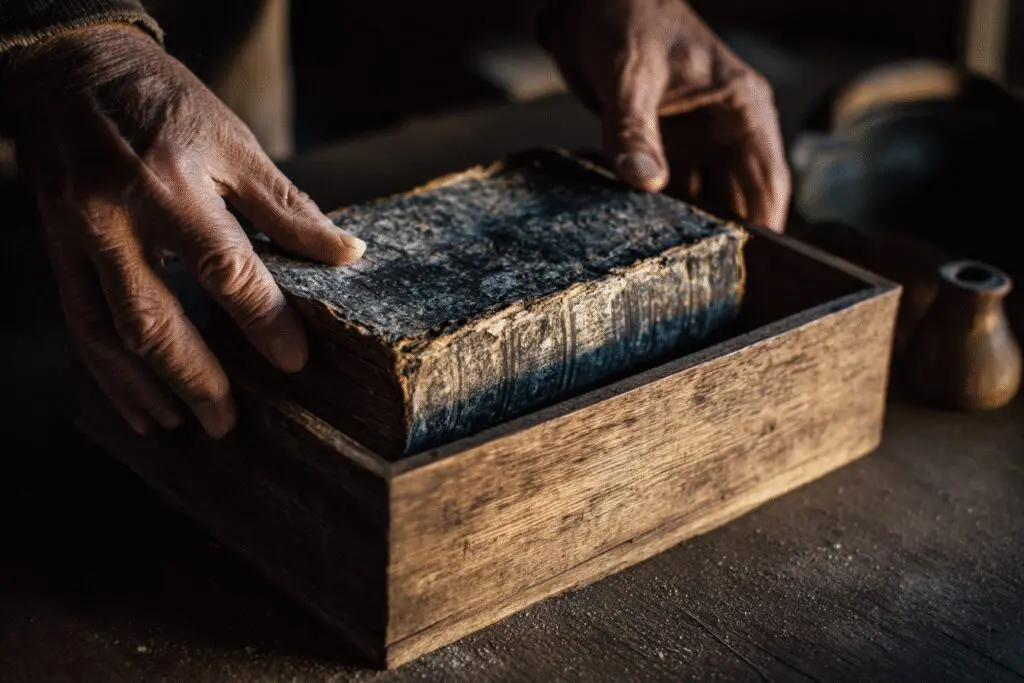Have you ever held a Bible so loved that its pages were tissue-thin and the cover was hanging on by a thread? I have. It sat on my shelf for years, filled with notes from a time my faith felt brand new. But it was falling apart. This left me with a heavy question, a question that feels almost taboo to ask: How to dispose of a Bible without feeling a profound sense of guilt?
If you’re asking this, it shows your heart. It shows reverence. You’re not looking to simply “throw away” God’s Word; you’re looking for a way to honor it, even in its final moments. The good news is, you are not alone in this, and there are several thoughtful, respectful ways to handle this situation. The process is less about a strict set of rules and more about the posture of your heart.
More in Bible Category
How Can I Be Saved Bible Verse
Is the Word Rapture in the Bible
Key Takeaways for Respectful Disposal
For those looking for a quick answer, here are the most widely accepted methods. We will explore each of these in much greater detail.
- Burial: This involves returning the Bible to the earth, often wrapped in a natural cloth. It’s a symbolic act of committal.
- Ceremonial Burning: A controlled, respectful burning can be seen as an act of release or transformation. This must be done safely and legally.
- Gifting or Donation: If the Bible is still usable, passing it on to a church, mission, or someone in need is a wonderful option.
- Repurposing: For the creatively inclined, using pages for art or framing verses can give a damaged Bible a new purpose, preserving its precious words.
Why Does This Question Feel So Complicated?
Let’s be honest for a moment. The hesitation we feel comes from a place of deep respect. Christians believe the Bible is the inspired Word of God. It’s the primary way He has revealed Himself to us. So, the thought of putting it in the trash alongside last night’s leftovers feels deeply wrong.
It’s not because the physical book—the paper, ink, and glue—is magical. Instead, it’s a sacred object because of what it represents. It’s a vessel for the holy, life-changing words that have guided generations. Therefore, treating the physical book with dignity is a reflection of our love for the God who gave us those words.
Is It Actually a Sin to Get Rid of a Bible?
This is often the core fear lurking beneath the surface. Does disposing of a Bible count as a sin? In short, the overwhelming consensus among pastors and theologians is no.
God is far more concerned with the state of your heart and your relationship with Him than with a physical object. The Bible itself points us to a relationship, not to the worship of the book itself. Your intention is what matters. If your goal is to respectfully retire a Bible that has served its purpose, you are acting out of reverence, not sin. It is the cavalier or hateful act of desecration that is sinful, not the thoughtful disposal of a worn-out tool of faith.
What Are the Most Respectful and Accepted Methods?
Once you’ve decided that a Bible is ready for retirement, you have a few paths you can take. Each one has its own beautiful symbolism. Think about which method resonates most with your own walk of faith.
The Burial Method: Returning It to the Earth
Just as our bodies are returned to the earth, burying a Bible is a poignant and deeply symbolic act. It’s a quiet, personal ceremony that acknowledges the book’s service and returns its physical elements to God’s creation.
How do you properly bury a Bible?
It’s a simple, reflective process. You don’t need a grand ceremony unless you want one.
- Find a suitable location. This should be on your own property, like a garden or a special spot in your yard. It should be a place where it won’t be disturbed.
- Prepare the Bible. You might wrap it in a natural material like linen or cotton. Some people choose to place it in a small wooden box. This protects it and adds another layer of dignity to the process.
- Say a few words. This is entirely personal. You could thank God for the wisdom you gained from its pages, read a favorite Psalm (like Psalm 119), or simply have a quiet moment of prayer.
- Commit it to the ground. Dig a hole deep enough to ensure the Bible won’t be accidentally uncovered. As you place it in the ground, you can reflect on the “ashes to ashes, dust to dust” reality of all physical things.
This method is perhaps the most common and is seen as a final, gentle resting place.
The Burning Method: A Sign of Release and Transformation
Fire in the Bible often symbolizes purification, sacrifice, and the presence of God. A ceremonial burning can be a powerful way to dispose of a Bible, viewing it as releasing the physical form while the spirit of the words endures. This is very similar to how the American flag is honorably retired.
What is the safe and respectful way to burn a Bible?
Safety and legality are paramount here. You absolutely must check your local ordinances regarding open fires.
- Safety First. Never start a fire in a dangerous or illegal manner. Use a designated fire pit, a grill, or a fireplace. Have a fire extinguisher or a source of water nearby.
- Create a “Clean” Fire. The fire should be started with the intention of this ceremony. It shouldn’t be a bonfire where you also happen to be burning trash or roasting marshmallows.
- The Ceremony. You can place the Bible on the hot embers of an already established fire. You might want to do this page by page or as a whole. As it burns, you can reflect, pray, or sing a hymn.
- Final Steps. Ensure the fire is completely extinguished. The ashes can then be buried, continuing the “return to the earth” theme.
This method can feel very final and definitive. For some, it is a beautiful way to symbolize the Word ascending to the heavens.
The Gifting Method: Giving It a New Chapter
What if your Bible is still in decent shape? Maybe it’s a version you no longer use, or you simply have too many copies. In this case, the most respectful and wonderful option is to give it a new life.
A Bible’s highest purpose is to be read.
Where can I donate a used Bible?
There are so many places that would be thrilled to receive a Bible.
- Local Churches: Many churches collect Bibles for outreach programs, new members, or ministries.
- Thrift Stores: Places like Goodwill or Salvation Army will gladly take them and find them a new home.
- Homeless Shelters and Prisons: These ministries are often in desperate need of Bibles.
- Missions Organizations: Many organizations send Bibles overseas to people who may not have access to one in their own language.
- “Little Free Libraries”: You might even place it in one of the small book-sharing boxes in your neighborhood. You never know whose hands it might fall into.
Before donating, it’s a nice touch to erase any personal notes unless you feel they might be an encouragement to the next reader.
Do All Christians Agree on How to Dispose of a Bible?
While most Christian traditions don’t have a single, dogmatic “rulebook” for this, the principle of respect is universal. Whether you are Protestant, Catholic, or Orthodox, the core idea is to treat the Bible as a special object.
For example, the Catholic tradition has a long history of respectfully burying or burning blessed items (like rosaries or palms from Palm Sunday), and this same logic is applied to Bibles. Protestant denominations, while having less formal tradition around this, universally encourage reverence over casual disposal.
The key is that this is a matter of conscience and personal conviction. For further academic and theological resources, the libraries at institutions like Yale Divinity School offer a wealth of information on Christian history and practice. Exploring such resources can provide a deeper context for how Christians have revered sacred texts throughout history.
What if My Bible is Damaged by Water or Mold?
Sometimes, disposal is not just about age, but about damage. A Bible that has been in a flood or has developed significant mold can be a health hazard.
In these unfortunate situations, burial or burning are often the safest and most practical options. Trying to salvage the book could be unhealthy, and it’s certainly not something you would want to donate. Acknowledge the loss, thank God for its service, and proceed with a safe disposal method.
A Final Moment of Reflection Before You Say Goodbye
Before you choose your method, I encourage you to take one last moment with your Bible.
Sit down and flip through its pages one last time. Look at the verses you underlined. Read the notes you scribbled in the margins. Remember the season of life you were in when a certain passage spoke directly to your soul.
This isn’t about worshipping the object. It is about honoring your own spiritual journey. It’s about being thankful for the ways God has used that specific book to shape you.
You might even offer a simple prayer:
“Lord, thank you for this Bible. Thank you for the truth, comfort, and guidance I found within its pages. As I lay this physical book to rest, I pray that Your Word would continue to be a lamp to my feet and a light to my path. May its truths remain written on my heart forever. Amen.”
In the end, how you dispose of a Bible is a personal act of worship. It’s a quiet conversation between you and God. He sees your heart, your reverence, and your desire to honor Him in all things—even in the small, tender act of saying goodbye to a well-loved book.
Frequently Asked Questions – How to Dispose of a Bible

What methods should I avoid when disposing of a Bible?
Avoid simply throwing the Bible in the trash or recycling it, as these actions do not show the honor due to God’s Word. Such methods treat the Bible as common waste, which dishonors its sacredness.
Can I give my old Bible to someone else or donate it?
Yes, if the Bible is still readable, consider giving it away or donating it. It can be a valuable gift to someone in need of God’s Word, such as a church, mission, prison ministry, or homeless shelter.
What are some respectful ways to dispose of a Bible that cannot be used anymore?
Respectful disposal methods include burying the Bible in the earth as a sign of giving it a proper farewell or burning it in a safe, private fire to return it to the earth in a respectful way, after which the ashes can be buried.
Does the Bible give specific instructions on how to dispose of old copies?
The Bible does not provide direct instructions on disposing of old or worn-out copies. However, it teaches us to treat sacred objects with respect, which guides us to handle the Bible with care, whether for disposal or reverence.
Why is it important to handle the Bible respectfully when disposing of it?
Handling the Bible respectfully when disposing of it reflects our reverence for God’s Word, which is considered holy because of the divine words it contains. Respecting the Bible in disposal shows our love and honor for God and His teachings, turning the act into an expression of worship.

